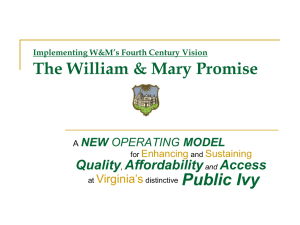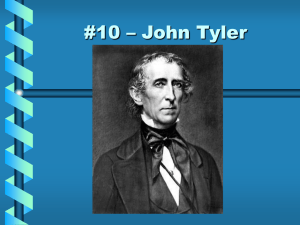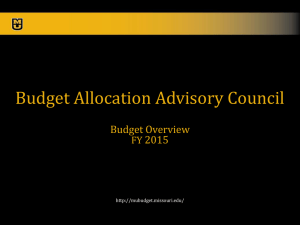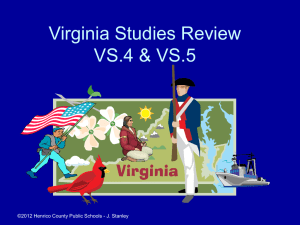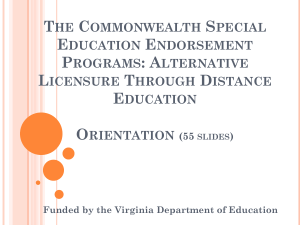Elementary School Workshop Presentation
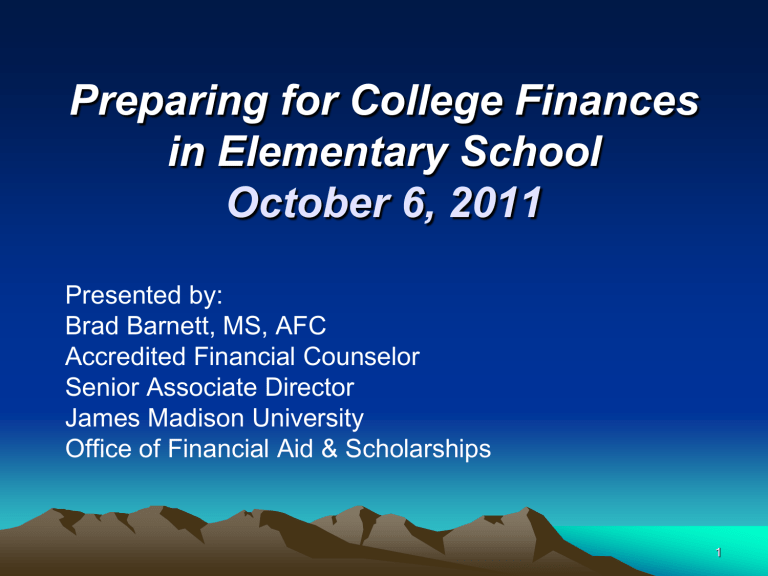
Preparing for College Finances in Elementary School
October 6, 2011
Presented by:
Brad Barnett, MS, AFC
Accredited Financial Counselor
Senior Associate Director
James Madison University
Office of Financial Aid & Scholarships
1
Before We Get Started
This PowerPoint Presentation will be available to download on the
JMU Office of Financial Aid &
Scholarships website www.jmu.edu/finaid
(under the “Prospective Students” link)
2
Objectives
• Review those involved in paying for college
• Understand college costs
• Discuss options to pay for college
• Answer questions
3
Consult with Appropriate
Stakeholders
• Determine who will be involved in paying for the student’s education
• Those parties should begin discussions now and develop a plan
• If you use a financial planner, talk with him/her about college savings
• Set realistic expectations…it’s okay to tell your child “no”
– Consider the opportunity cost of your money. If you spend a dollar somewhere, by default you cannot spend it somewhere else. Money is finite.
– I’ve seen many parents mortgage their house and/or spend their retirement savings to send a child to the college he/she wants to attend
4
Learn More About Schools Now
• Understand the costs of schools
• Examine the types of schools
• Try not to let cost be a large deterrent at this point, you have some time to save and plan
5
What Does College Cost Now?
School Type (2011-12)
Virginia 4yr Private Universities (25)
Average
Tuition/Fees
Average
Room/Board
Average
T/F + R/B
$27,045 $8,809 $35,854
Virginia 4yr Public Universities (15) $9,499 $8,672 $18,171
Virginia Community Colleges (23) $5,067 N/A N/A
6
Highest and Lowest
School Type (2011-12)
Highest
Tuition/Fees
Virginia 4yr Private Universities (25) $43,170
Highest
Room/Board
Highest
T/F + R/B
$11,100 $52,614
Virginia 4yr Public Universities (15)
Virginia Community Colleges (23)
$13,184
$3,900
$10,300 $22,024
N/A N/A
School Type (2011-12)
Virginia Community Colleges (23)
Lowest
Tuition/Fees
Virginia 4yr Private Universities (25) $14,630
Virginia 4yr Public Universities (15) $6,700
$2,840
Lowest
Room/Board
Lowest
T/F + R/B
$5,200 $19,850
$7,080 $15,328
N/A N/A
7
What Will College Cost Later?
• There is no way to accurately predict what college will cost in the next 8 to 13 years
• For planning purposes, you may want to use an annual increase in billable costs of 6%
• Using 6%, 13 years out (2024-2025) tuition/fees + room/board at the average 4 year Virginia private college could be $78,062
• Using 6%, 13 years out (2024-2025) tuition/fees + room/board at the average 4 year Virginia public college could be $39,562
• Using 6%, 13 years out (2024-2025) tuition/fees at the average
Virginia community college could be $11,032
*Figures provided for demonstration and planning purposes only and are no guarantee of what costs will be in the future.
8
Net Price Calculators
• All schools are required to have a “net price calculator”
• They all will NOT look or function identically
• Example:
– Go to www.jmu.edu/finaid
– Select “JMU Aid Estimator” on the top bar
– Answer the applicable questions
– Receive an estimated award immediately
9
How Am I Going To Pay For
College
Five primary sources of financial aid are:
• Federal
• State
• Institutional
• Private
• Self/Family
10
Federal Assistance
Primary federal aid programs:
• Pell Grant
• Supplemental Educational Opportunity Grant
(FSEOG)
• Federal Workstudy
• Federal Perkins Loan
• Federal Direct Loan
• Federal Parent PLUS Loan
• Visit www.studentaid.ed.gov
for more details
*Aid programs are subject to change
11
State Assistance
Primary state aid programs:
• Virginia Guaranteed Assistance Program
• Commonwealth Award
• Tuition Assistance Grant Program (private colleges only)
• College Scholarship Assistance Program
• Virginia Transfer Grant
• Visit www.schev.edu
for more details
*Aid programs are subject to change
12
Institutional Assistance
• Need-based grants
• Need-based scholarships
• Merit-based scholarships
• Combination Need/Merit-based scholarships
• Institutional Employment
*Aid programs are subject to change
13
Private Assistance
Financial aid from private resources can be the most elusive of all aid programs
Available From:
•
Local businesses
• Civic groups
• Churches
• Private benefactors
• National organizations
Where to Look:
• High school guidance counselors
• Write, call, or visit businesses, civic groups, churches, etc.
•
Public libraries
• Internet (free ones only)
14
What Can I Do Now?
• SAVE, SAVE, SAVE!
• If you have not started, you should do so immediately
• If you have started, evaluate your current savings plan and see if you can afford to increase it if necessary
• There are many savings options
15
Zero-Based Budget
• Income minus expenses each month equals zero
• This means you have told every dollar of income you have to do something very specific
• If you stick with this for each category, you will not overspend and will likely avoid unnecessary debt and expenditures
16
Budget!
• Often overlooked…its not always about making more money
• If you begin using a zero-based budget, you may find you are spending money on things you do not need now
• Can incorporate college savings into your budget
• Get control of your money!
• Generally, will spend less if you budget
17
Cost of Living Adjustments
• Sample adjustments:
– Cell phone: If your plan costs $200/month, eliminate some options to perhaps $100
– Dining out: If you spend $200/month dining out, cut back to $50
– Car payment: If you have a $400/month car payment, sell the car and pay cash for something less expensive
– Total savings recouped in this scenario is $650/month that can be used towards college savings
• This is merely one example and may not apply directly to you
• Looking at where you spend money and reducing some of the
“wants” can help make college more affordable
• Track your spending (every dollar) for one month…it might surprise you
18
Coverdell Education Savings
Account (ESA)
• Money invested for college that can generally be withdrawn tax-free if used for college
• Annual contribution is currently $2,000 per child (from all contributors)
– Unless Congress takes action, the limit will be reduced to $500 after
2012
• Contribution goes into an account that will eventually be distributed to your child if not used for college. You cannot simply refund the account back to yourself like you can with most 529 plans. This means you lose some degree of control.
Website to research this program http://www.savingforcollege.com/coverdell_esas/
19
529’s
Two Types:
–Prepaid Tuition Plan
–Education Savings Plans
Website to research this program http://www.savingforcollege.com/college_savings_201/
20
Virginia Prepaid Tuition Plan
(VPEP)
• Locks in “tomorrow’s” tuition at “today’s” prices
• Will pay tuition based on your contract plan
• Community College Plan:
– One, two, or three year contract
• University Plan:
– One, two, three, four, or five year contract
• Must purchase at least one year, but can mix and match plans
• Limited enrollment period
• Has become progressively more expensive over the years
Information available at www.virginia529.com
21
VPEP Benefit
(in-state)
• Pays in-state undergraduate tuition and mandatory fees for normal, full-time course load at Virginia public colleges
• Can be applied to private colleges, but will only pay the lesser of:
– Payments made on the contract plus the actual rate of return, or
– The highest in-state undergraduate tuition and mandatory fees at Virginia public schools for the same year
22
VPEP Benefit
(out-of-state)
• Can be applied to out-of-state colleges, but will only pay the lesser of:
– Payments made on the contract plus a reasonable rate of return, or
– Average in-state undergraduate tuition and mandatory fees at Virginia public schools for the same year
• Will likely be less than the average Virginia public college costs
23
Virginia Education
Savings Plans
• Virginia has three plans:
•
VEST (available through Virginia College Savings Plan)
•
CollegeAmerica (available through financial advisors)
• College Wealth (FDIC insured through participating banks)
• Money is invested to grow tax free for college
• Can be used for qualified college expenses such as tuition/fees and room/board
• Flexibility in investment options and contribution amounts
• Not guaranteed by Virginia
• Growth is subject to market conditions
• Enrollment open year round
Information available at www.virginia529.com
24
ESA or 529
(Savings Plan) Growth
Example based on an average annual return of
10% (long term investing)
– Kindergartner whose first semester of college will be August 2024 (13 years)
– Begin investing in July 2011, starting with zero saved before this point
– Stop in July 2024
– Investing for 13 years
25
Average Growth of Example
(assume 10% rate of return)
• $100/month
• Total of $15,600 invested
• Grows on average to $31,795
• $300/month
• Total of $46,800 invested
• Grows on average to $95,385
• The longer you save, the more you can earn
– Example, $200/month over 10 years would grow to around $63,590
(on average)
• This is no guaranty of future growth or value
• Growth is subject to various economic conditions
• Consult an expert before investing
• If you did nothing more than put the money “under your mattress”, you would at least have what you saved
26
Saving Impact on Aid
Eligibility
• You can’t predict the future
• Congress can change the rules so what applies today will not when your children got college
• You are better off being prepared to pay for college than hoping government programs or institutional aid will be available
• Control what you can
• You can contribute to an ESA and 529
• ESA’s and 529’s are treated as an asset of the custodian, not the beneficiary, which is generally the parent
27
Planning on Loan Debt?
• In May 2011, NBC reported that student loan debt has reached $800 billion, more than the combined credit card debt of all Americans (it is expected to ready $1 trillion in the very near future)
• According to The Project on Student Debt, students now come out of college with an average of $24,000 in student debt
• $24,000 in student loans equals roughly $276/month in payments for 10 years (not including capitalized interest)
• Lost Opportunity Cost:
• Loan payments will total $33,100 in 10 years, and $9,100 of this is interest!
• $276 invested with an average rate of return of 10% over 10 years is $57,000
• $276 stuffed under your mattress for 10 years is $33,100
28
Other Options
• Personal savings
• Investments (e.g., Mutual Funds, CD’s, bonds, etc.)
• Payment plans offered through the college
• Part-time employment
• Private Loans (last resort)
• Federal Parent Loans
• Home equity (risky)
• Reducing debt or expenses prior to college to make paying for college more affordable
• Be careful of sacrificing your retirement to pay for college
29
Web Resources
• www.savingforcollege.com
• www.virginia529.com
• www.collegeboard.org
• www.schev.edu
• www.studentaid.ed.gov
30
Summary
• Having a plan that is reliant on future government and/or school funding is not the safest way to go
• Control what you can control…your spending and saving (budget)
• Start saving now
• Have realistic expectations of what you can afford, and stick with it
31
Questions
Brad Barnett
– Phone: (540) 568-2894
– E-mail: barnetbd@jmu.edu
32
